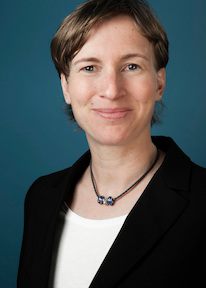
The fall Women in Math lecture will be delivered by Britta Peis, Professor of Management Science with the School of Business and Economics at Rhine-Westphalia Institute of Technology (RWTH) Aachen University.
Biography: Britta Peis was born in Winterberg in 1975. She studied sport sciences at the German Sport University Cologne and mathematics at the University of Cologne. She received her doctoral degree from the Center for Applied Mathematics at the latter in 2006, having worked and studied there since 2002. After subsequently holding a position at Technical University of Dortmund's (TU Dortmund) Chair of Discrete Optimization, Britta Peis joined the research group Combinatorial optimization and graph algorithms at TU Berlin University in 2007. From October 2010 to April 2011, she held the position of interim professor of Mathematical Optimization at Magdeburg’s Otto von Guericke University. In September 2013, Britta Peis joined the School of Business and Economics at RWTH Aachen University as professor of Management Science.
Title: Resource competition on matroids
Abstract: Congestion games are widely used to model and analyze the behaviour of selfish acting uncontrolled individuals, competing over a commonly used set of resources. A typical example of congestion games can be observed every day at rush hour in a congested city: each individual car driver chooses a route through a street network. The travel time of each of the streets ("resources") in use highly depends on the congestion caused by the route choices of the other car drivers.
A stable state ("equilibrium") is reached if none of the individuals can improve its outcome by unilateral switching to an alternative route ("strategy"). The famous Braess paradox describes the interesting phenomenon that improving the network infrastructure, for example by building new streets, may in fact lead to higher travel times under an equilibrium.
Game theory now investigates under which conditions equilibria exist, are efficient, and admit a Braess paradox. As it turns out, structural properties and algorithmic techniques from combinatorial optimization can be extremely helpful for such investigations. For example, as will be shown in the talk, matroids are the only structures that are immune to Braess paradox, and that guarantee the existence of equilibria for several variants of congestion games (joint work with Tobias Harks).